Alcohol is a staple of many social events, from celebrations to casual get-togethers. While moderate consumption may not seem harmful, excessive or frequent drinking can have significant consequences for your oral health. Many people don’t realize that alcohol can contribute to tooth decay, gum disease, and other dental problems.
At Alora Dental, we emphasize preventive care and education to help our patients maintain a healthy smile. In this article, we’ll explore how alcohol affects your teeth and gums, the risks involved, and what you can do to protect your oral health.
How Alcohol Affects Your Teeth and Gums
Alcohol can have both immediate and long-term effects on your oral health. Here are some of the most significant ways drinking can impact your teeth and gums:
Dry Mouth and Reduced Saliva Production
One of the biggest concerns with alcohol consumption is that it causes dry mouth by reducing saliva production. Saliva is crucial for maintaining a healthy mouth because it:
Washes away food particles and bacteria
Neutralizes acids that cause tooth decay
Helps prevent bad breath
Without enough saliva, bacteria and plaque can accumulate more quickly, increasing the risk of cavities and gum disease.
Increased Risk of Tooth Decay
Many alcoholic beverages contain high levels of sugar and acid, both of which contribute to tooth decay. Some of the worst offenders include:
Cocktails
Often mixed with sugary syrups, soda, or fruit juice.
Beer
Though not as sugary, it contains fermentable carbohydrates that bacteria feed on.
Wine
Contains both sugar and acid, making it particularly harmful to enamel.
The acid in alcoholic drinks can also weaken your enamel, making your teeth more vulnerable to cavities and sensitivity.

Staining and Discoloration
Drinks like red wine, whiskey, and dark beer can cause long-term staining due to their high levels of tannins. These tannins cling to the enamel and create yellow or brown discoloration, which can be difficult to remove without professional teeth whitening.
Even white wine and clear spirits can contribute to staining by softening enamel, making it easier for other foods and drinks (like coffee and tea) to stain your teeth.
Gum Disease and Inflammation
Excessive alcohol consumption can also affect your gum health. Studies have shown that alcohol can weaken the immune system, making it harder for the body to fight off infections, including gingivitis and periodontitis.
Symptoms of gum disease include:
- Red, swollen gums
- Bleeding when brushing or flossing
- Persistent bad breath
- Receding gums
If left untreated, gum disease can lead to tooth loss and even affect your overall health.

Increased Risk of Oral Cancer
One of the most severe consequences of heavy drinking is the increased risk of oral cancer. Alcohol can damage the cells in the mouth and throat, making them more susceptible to cancerous changes.
Those who smoke and drink alcohol together are at an even higher risk, as tobacco and alcohol have a synergistic effect, greatly increasing the likelihood of developing oral cancer.
How to Protect Your Teeth While Drinking Alcohol
If you enjoy drinking alcohol but want to minimize its effects on your teeth and gums, follow these tips:
Drink Water Between Alcoholic Beverages
This helps wash away acids and sugars while keeping your mouth hydrated.
Use a Straw
Drinking through a straw can reduce direct contact between alcohol and your teeth.
Avoid Sugary Mixers
Opt for soda water or fresh citrus slices instead of sugary sodas and juices.
Brush and Floss Before Bed
Never go to sleep without brushing and flossing after drinking alcohol.
Visit Your Dentist Regularly
Professional cleanings at Alora Dental can help remove stains and prevent decay.
Keep Your Smile Healthy with Alora Dental
If you’re concerned about the effects of alcohol on your teeth, schedule an appointment at Alora Dental. Our expert team can provide personalized recommendations, preventive treatments, and professional cleanings to keep your smile in top shape!
